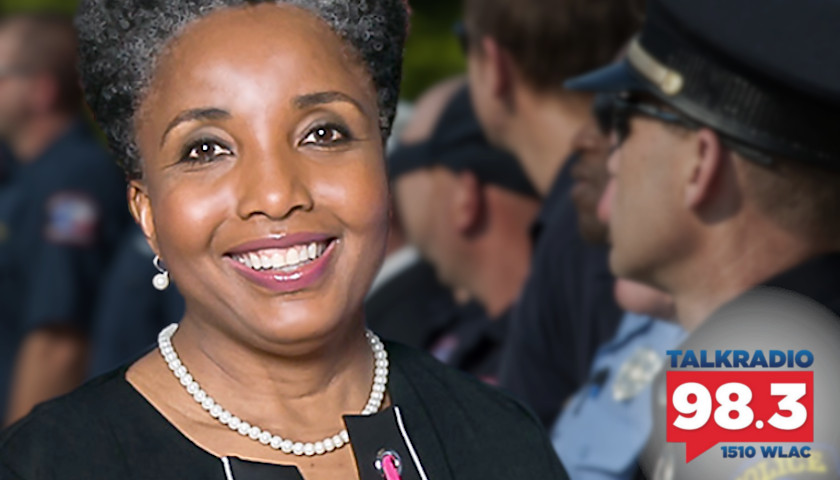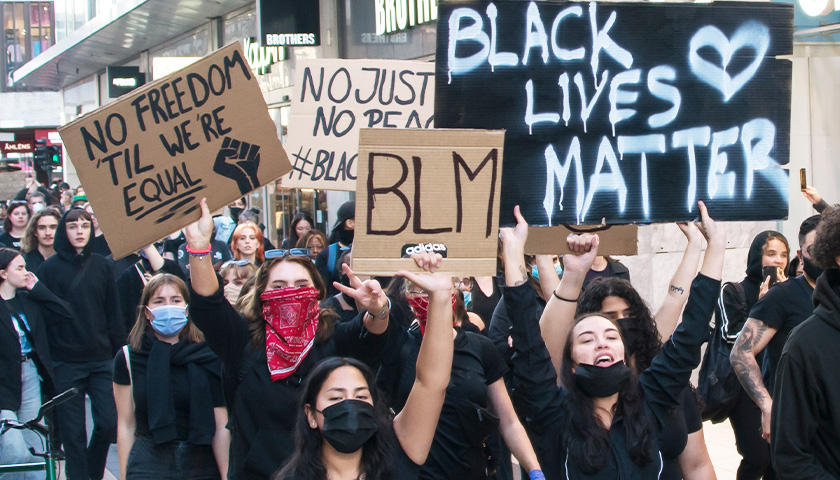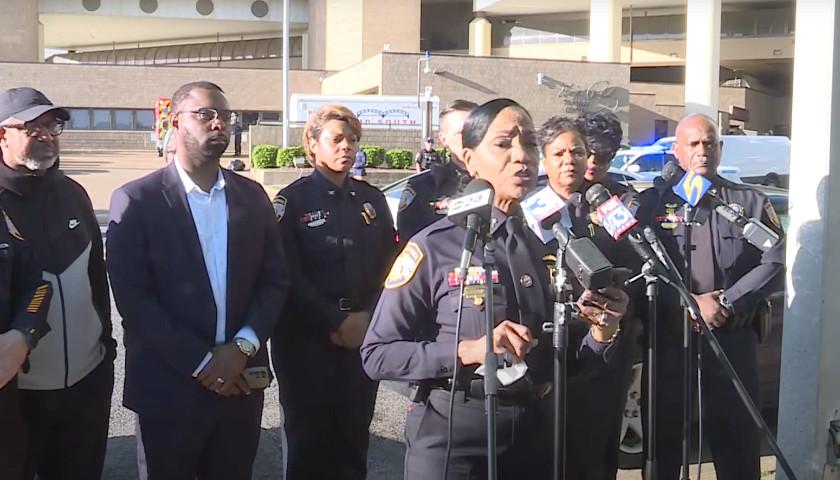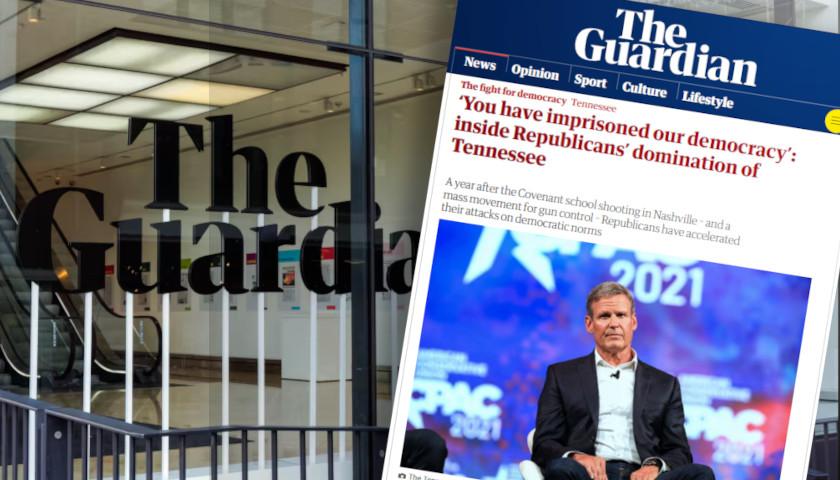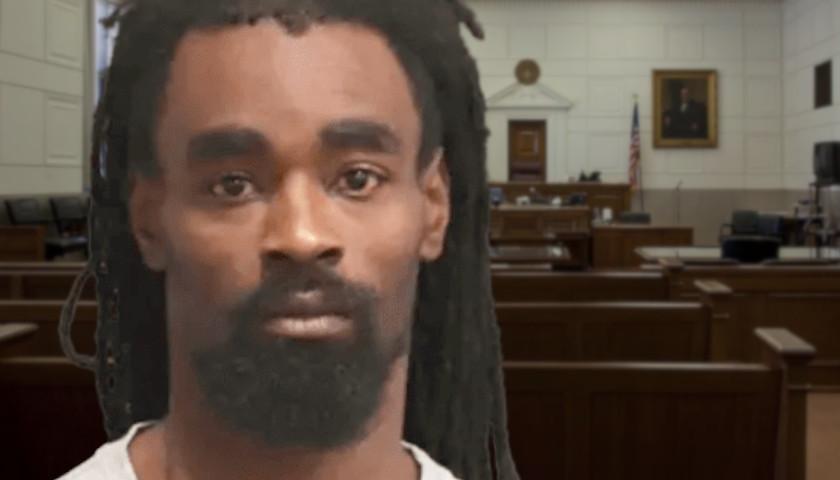Live from Music Row Thursday morning on The Tennessee Star Report with Michael Patrick Leahy – broadcast on Nashville’s Talk Radio 98.3 and 1510 WLAC weekdays from 5:00 a.m. to 8:00 a.m. – host Leahy welcomed all-star panelist, Dr. Carol Swain, to the studio.
During the third hour, Swain weighed in on the recent Gallup survey which revealed Black Americans do want law enforcement in their communities. She later added that the good news today is that Black America is not at war with the police and that the average common sense person wants police presence.
Leahy: In studio with me this morning good friend, all-star panelist, former Vanderbilt professor and all-around nice person Carol Swain. Good morning Carol.
Swain: Good morning.
Leahy: We have a couple of things of note. We’ve been talking about polls today. You brought to my attention a very interesting poll. It’s an area where you have some special expertise as a former professor at Vanderbilt.
Swain: I thought you were going to say as a Black person. (Laughs)
Leahy: Well, I suppose that as well. That as well. It’s a public policy issue. The topic is Black Americans want police to retain a local presence.
Swain: What? I thought Black Americans wanted to defund the police?
Leahy: Now that’s interesting because you know people might have that impression. But you talk about how things are presented in misleading ways. Yes. The organization known as Black Lives Matter is all in favor of defunding the police. Now the three founders of that organization which is a project of a 501-(c)(3)funded and bought by George Soros.
Swain: Are you sure they are a 501-(c)(3) because I remember there was a controversy a few weeks ago?
Leahy: A Thousand Currents is the 501-(c)(3). The way these things happen sometimes you have a non-profit. If you want to have people to be able to donate on a tax-deductible basis you’ve got to get approval under code of 501(c) of some law. That’s what they call these non-profit organizations.
Swain: Well the good news for the American people is that the Gallup did a poll between June 23 or July.
Leahy: Yes. June 23 thru July 6.
Swain: And what they found is that Black Americans want police to retain their local presence. And so Black Americans who are more likely to see police than any other group because of the crime rate they want police in their local communities.
Leahy: Gee, what’s wrong with this? Black Lives Matter wants to defund the police. I hear in Minneapolis and Seattle they want to abolish the police department and replace it with the department of social work and justice and lollipops? Is that the department they want to put in there?
Swain: Yes. Black Lives Matter the organization that’s pressuring colleges and universities like Belmont and corporations, they want to defund the police but not Black Americans. And there is not a huge difference between Black Americans and White Americans. The American people have common sense and they know they need law enforcement.
Leahy: That’s fascinating because if you watch the news and listen to all the press releases from the organization Black Lives Matter which his founded by three Black women who proudly proclaim that they are Marxist trained. You look at those organizations, I don’t’ see a lot of Black faces in the Black Lives Matter protests. I see a lot of White liberal faces.
Swain: And these three Black women, two of them are openly queer. They call themselves queer. I’m not calling them queer.
Leahy: You are using the word they use to describe themselves. They self-identify by that word.
Swain: And they are also about abolishing the traditional family and from it’s birth.
Leahy: Whoa. Black Lives Matter wants to abolish the traditional family.
Swain: You know mom, dad.
Leahy: I didn’t hear that on NBC News.
Swain: No.
Leahy: Did you hear that on CNN?
Swain: Well it’s not relevant for CNN because they don’t believe in the traditional family so that would not be news for them. But the good news for us today is that Black America is not at war with the police. The average person wants a police presence. They are unhappy about some of the encounters they have with police. And we know that the media overplays the ones that go bad.
Leahy: I don’t think anybody would be happy having any kind of interaction with a police officer, but you know…
Swain: There are times you do want to have an interaction with the police. (Chuckles)
Leahy: I totally stand corrected on that. You are absolutely right.
Swain: And I can tell you that over the years that I’ve had interactions with police, for the most part, they’ve always been positive. But by one negative experience that occurred here in Tennessee within three months of moving here, I got my first ticket ever.
My first speeding ticket. And in New Jersey where there had been all these studies about police profiling Blacks and tickets and that type of thing, I never got a ticket. That doesn’t mean I wasn’t stopped. They always let me go. (Laughter)
Leahy: But you got a ticket here.
Swain: I got a ticket here.
Leahy: The first time I came to Nashville in 1990 on 440. The first week we came and were thinking of moving to Nashville. The speed limit on parts of 440 is 55, right? Who drives 55 on 440? Apparently some people do. But mostly its faster than that.
I was driving like 65 and was pulled over. This is back in 1990. And I said, gee officer. I’m going with traffic. And they said yeah, you’re 10 miles over the limit. And I got a ticket for that too. I remember that. That was my own personal welcome to Nashville.
Swain: I haven’t been stopped that many times. Maybe five times in my life. But I’ve been stopped by police officers that really did want to tell me that my tail light was out. And because I can’t see behind my car it was very helpful to me to have that interaction. So whenever I’m stopped by a police officer I immediately think, what did I do? Because I assume that I did something wrong. I never assumed that they are stopping me because I’m Black.
Leahy: On this Gallup survey, they saw a little difference by race in local exposure to police. I’ll read from it. The survey also asks Americans to estimate how often they see police in their neighborhood. Black Americans reported exposure to local police is slightly above the national average with 32 percent saying they see the police often or very often in their neighborhood. This compares with 22 percent with White Americans and 21 percent of Asian Americans. The Hispanic experience is similar to that of Black Americans with 28 percent often seeing police where they live.
Swain: And that has to do with crime levels in communities. A lot of Black people complain that they call the police and the police don’t show up. If you look at cities like Nashville where I ran for mayor a couple of times unsuccessfully. (Giggles)
Leahy: Let me just say, wouldn’t Nashville be better off if we had Mayor Carol Swain instead of Mayor John Cooper.
Swain: They would not have appreciated me. They needed Mayor John Cooper to realize what they missed. (Leahy laughs)
Leahy: I don’t think any business owners, restaurant owners, or bar owners in downtown Nashville really have much positive to say about Mayor John Cooper.
Swain: There is nothing positive to say. And I can tell you under the last three mayors the police department in Davidson County has been starved as far as resources. And so we don’t have enough police officers. This is not the time to talk about defunding the police. In fact, had I been elected mayor I would have increased the number of police officers by 200 or 300.
Leahy: Amen to that!
Swain: We do need a greater police presence. And we don’t need our police officers being used to do social work.
Leahy: Has Mayor John Cooper placed a phone call to you Carol to ask for your advice as they select a new chief of police?
Swain: No. And I can tell our audience that I met with Mayor John Cooper a few months ago before things went badly about the police department. And I pointed out that there was a need for a new police chief. We had a pleasant conversation. He even asked me how he should go about selecting the next police chief.
And I gave him advice because after he won the race he did reach out to me. And I had every expectation that he would listen to me and give me access. But he gave me access but nothing I ever recommended did he follow. And I have a degree in criminal justice. I have a great relationship with the police officers in Nashville.
I would like to be involved in that process because the selection of the next police chief is one of the most important things that will be done in Davidson County. We cannot afford to have the wrong person placed just because we are trying to satisfy the politically correct crowd.
Listen to the third hour here:
– – –
Tune in weekdays from 5:00 – 8:00 a.m. to the Tennessee Star Report with Michael Patrick Leahy on Talk Radio 98.3 FM WLAC 1510. Listen online at iHeart Radio.

